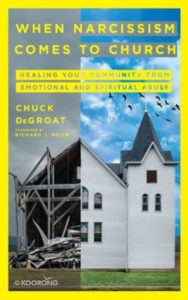Chuck DeGroat is Professor of Counselling and Christian Spirituality at Western Theological Seminary in Michigan, USA. He is a licensed therapist with more than 20 years experience, an ordained Reformed Church minister and co-founder of Newbigin House of Studies, an urban and missional training centre in San Francisco.
He’s also an author and will soon release his new book When Narcissism Comes to Church: Healing Your Community From Emotional and Spiritual Abuse. In it, he combines the accumulated wisdom of his years of clinical experience, pastoral ministry and seminary training to tackle a concerning subject.
Whistleblowing glorifies Christ: challenging narcissistic leaders and toxic cultures
Loyalty is a dangerous virtue: The church needs whistleblowers
Bullies: Where abusive leaders come from
Coming to terms with Christian leaders who do terrible things
As increasing instances of abuse and bullying within the global church are being brought to light, Eternity asked DeGroat to explain the who, what, why and how of when narcissism comes to church.
Eternity: ‘Narcissism’ is a word that gets thrown around quite a lot these days – what do you believe the best definition of the term is?
Chuck DeGroat: There is the common psychological definition which includes grandiosity, a lack of empathy, and impairments of intimacy and identity, among others. That’s a fair place to start. But I’d also say that narcissism comes in a number of different guises, which sometimes look less grandiose but no are less sinister. Power can be abused in obvious and subtle ways, and narcissists are adept at manipulating, exploiting, and empowering themselves, all to protect a fragile sense of their own self-identity.
E: Do we all have the potential to become narcissists? And if so, how do we keep those tendencies restrained?
CDG: I think we begin as little ones with a kind of healthy narcissism – “Look, Mummy, I can do a cartwheel.” This “look at me, look at me” phenomenon is normal, and if we’re loved well it doesn’t become a pervasive sense of identity. Sadly, if one grows up without the love they need, they’ll clamour for it, grasp for it, manipulate for it. In that sense, many are capable of some form of narcissism, although not as many will be diagnosably narcissistic, according to DSM-V* categories or clinical testing.
*The Diagnostic and Statistical Manual of Mental Disorders (DSM–5) is the product of more than 10 years of effort by hundreds of international experts in all aspects of mental health. Their work has yielded an authoritative volume that defines and classifies mental disorders in order to improve diagnoses, treatment, and research.
I do believe that pastoral ministry may, indeed, be a magnet for those with narcissistic tendencies.
E: Is narcissism more prevalent in churches than other organisations? If yes, are there particular factors that make it an ‘easy route’ for individual narcissists themselves or that make a church community vulnerable?
CDG: While we do not have good studies or solid numbers about the prevalence of narcissism among pastors or in churches, I do believe that pastoral ministry may, indeed, be a magnet for those with narcissistic tendencies.
Think about it – many, many people fear public speaking, but those who become pastors not only confidently speak each week, but speak the word of God! Now, there are a good many pastors who do this with humility, but in my many years of assessing pastors psychologically, I’ve found that a majority do test in the general “cluster” of personality disorders closely related to narcissism.
The factors that make particular groups of people, subcultures, even congregations vulnerable are complicated. I don’t think we can pigeonhole a pretty pervasive psychological phenomenon. I just think we need more research on this … We’re only on the cusp and making guesses.

E: What might narcissism look like in a church setting? Are there certain aspects of a church community that allow someone exhibiting narcissistic behaviour to gain a foothold? Is it generally a leadership problem, or structural?
CDG: Pastoral narcissism can be seen in a cluster of characteristics. Narcissistic pastors need to be at the centre of all decision-making. They are impatient with staff and congregants, especially needy ones. They constrain others by their demands and fear of losing control.
They feel entitled. They feel threatened by others and seem perpetually paranoid, especially among those they perceive to be brighter or more gifted. Thus, they always feel like they need to be the best and brightest in every room. They are inconsistent and impulsive, they praise and then withdraw praise, and they intimidate to get their way.
Finally, they manifest what I’ve coined “fauxnerability” – a faux vulnerability, with the pretence of insight about themselves or their Enneagram type or mental health, but all as a facade to ingratiate themselves with others.
Narcissists often make people feel crazy. There are rarely physical wounds. But the emotional and spiritual abuse is real.
E: Lots of churches will have a narcissist in their midst but they aren’t always identified and confronted. How can churches become better at identifying and confronting narcissism? What should they look for and what should they do?
CDG: I’ve been dealing with this for twenty years, and I think we’re still only at the beginning of the conversation. What I’ve noticed with my new book is that it is giving people words to name seemingly invisible realities.
Narcissists often make people feel crazy. There are rarely physical wounds. But the emotional and spiritual abuse is real. It begins with people taking seriously the abusive dynamics, and naming them courageously. Sometimes this comes with great risk. But unless we start talking, we’ll continue to watch narcissism play itself out in our churches.
E: Can you give some keys for how churches can build systems which protect individuals from narcissists developing and others being exploited by them?
CDG: I think that systems that are accountable, relationally transparent, and where truth-telling is valued do not tend to support narcissistic leaders. In systems that are unaccountable, narcissistic leaders have free-reign, often choosing staff or elders who are ‘yes-men’ or ‘yes-women’.
When I use the term “relational transparency”, I mean cultivating an environment of knowing and being-known, where vulnerability is prized and not exploited. By “truth-telling” I mean sharing with each other how we experience them. A healthy pastor is willing to receive feedback about how he/she impacts others.
Christians follow a humble suffering servant. Herod exploited power, not Jesus. And yet we look more like Herod, at times.
E: Looking at recent prominent examples in the news – Acts 29 and Jean Vanier – can you see elements of narcissism might have been involved in those situations developing? Or is that over-reach? If they did involve narcissism, what can we learn from these situations?
CDG: I don’t make a habit of diagnosing narcissism in church leaders in the news, but when I see recurring patterns across large churches where there is little accountability, relational health, or an embrace of a culture of honest truth-telling, I begin getting suspicious.
We seem to see repeated behaviours emerge in stories across a variety of ecclesial traditions – exploitation of one’s role or power, bullying, silencing, shaming, terminating truth-tellers, leaders who insulate themselves, leaders protected by their other powerful friends. I could go on.
It just seems that when a new story breaks, I find myself saying, “Here we go again – same story, different context.” Because of that, why wouldn’t we say, “We have a problem. It’s time to talk.”
Christians follow a humble suffering servant. Herod exploited power, not Jesus. And yet we look more like Herod, at times.
Chuck DeGroat’s new book, When Narcissism Comes to Church: Healing Your Community From Emotional and Spiritual Abuse is available for pre-order at Koorong for $31.99 and due for release later this month.




